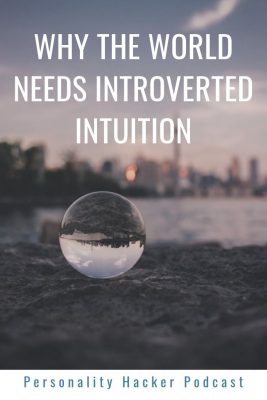Download Episode Here – right click link and select “Save Link As…”
In this episode, Joel and Antonia go on a journey of discovery where they showcase the need for positively expressed Introverted Feeling in today’s world.
In this podcast you’ll find:
- The Wire (HBO)
- Introverted Intuition (Ni) “Perspectives”
- Ni is a perceiving process
- Dominant function for INTJs & INFJs
- Copilot function for ENTJs & ENFJs
- Real understanding without the depth of intimacy that Fi feels.
- Ni feels objective. Understanding for understanding sake without empathy.
- Being able to understand someone is different from validating their feelings.
- Compassion can be the result, but it’s not the mechanism Ni uses when understanding another person’s perspective.
- Ni gives us the ability to study things dispassionately
- NTJs are more likely to look at everything in concepts of systems.
- NFJs are more likely to look at people as systems.
- But both can play both sides.
- It’s about removing the individual’s personal feelings, so those feelings don’t create bias.
- To get underneath what is happening
- Fully clocked Ni is a simulation of Se which observes reality as it comes.
- Instead of outside world sensory info (Se), Ni simulates that process internally.
- Entire realities created within itself.
- If some of our language around Ni sounds like Ti and Fi, remember that T/F are judging functions. N/S are learning functions.
- Ti is looking for truth
- Fi is looking for intent/desire
- Ni doesn’t want anything. It follows its internal bliss and allows things to surface as it will.
- It has the intent of insight, but it doesn’t want anything. It’s just observing.
- Ni is captured by simulated reality.
- Si has a past orientation. Impressions built over time. Experiential.
- Ni doesn’t have to experience something. It takes what it understands about sensory stimuli and creates simulations of reality.
- Why does the world need Ni?
- Black Mirror (Netflix) looks at how technology advances to dystopian futures.
- Ni developed to assist survival situations.
- What does it look like if this happens?
- Ni gives us the importance of consequences.
- Ni can run the simulation and share it in a way that others can understand.
- What will happen down the line if I knock this domino over here?
- Ni taps into the depth of imagination.
- Ni looks at the fundamental principles of the human mind.
- How do minds operate? What are the patterns that the human mind tends to attach?
- Fi: “Whatever is most personal is most universal.”
- Ni: “The macro reflects the micro, and the micro reflects the macro.”
- We have a lot of disagreements right now; Ni can help bridge the gap to create a simulated shared reality.
- For Fi, it understands the power of narrative, and if it doesn’t dive deep into its intent and motivation, it can start to manipulate the power of narrative to get what it wants.
- Getting to that dispassionate place is hard for NJs (especially NFJs).
- NJs mind has given them a place to go to create psychological distance from people.
- Ni can keep shifting perspectives until it finds one it likes.
- “I’ll just find a perspective where I’m happy.”
- What crosses supports you.
- All of our strengths can be turned against ourselves.
- Ni can get so lost in its simulations that it doesn’t bring its gifts to the world. It just stays in a place that isn’t good because it can make peace with it… for a time.
- The world needs sophisticated Ni to keep the gift of being able to see multiple perspectives and run simulations of worlds that haven’t been created.
- The world needs Ni.
- We are entering a more complex world. We cannot know what is going to happen.
- We aren’t going to make it as the human race unless we have a future perspective showing us where we are heading.
- Ni in the backseat can still give you a future paced viewpoint.
- ESTP: “Some people don’t know they’re alive unless they’re in pain.”
- They understand that people come with certain mindsets.
- Fi can hold space for the darkness of the heart.
- Ti can hold space for people’s darker thoughts.
- Ni can hold space for people’s mindsets that aren’t serving them.
- Si can hold space for people with dark pasts.
- Ni taps into how we talk to ourselves.
- Ni users love NLP: How our minds construct reality.
- ePrime
- Inner dialogue is not the same as inner narrative.
- Tap into the inner dialogue and the way you use words to describe your reality.
To subscribe to the podcast, please use the links below:
Subscribe with iTunes
Non-iTunes Link
Soundcloud
Stitcher
Google Play
Spotify
Radio Public
PlayerFM
Listen Notes
If you like the podcast and want to help us out in return, please leave an honest rating and review on iTunes by clicking here. It will help the show and its ranking in iTunes immensely! We would be eternally grateful!
Want to learn more?
Discover Your Personal Genius
We want to hear from you. Leave your comments below…



Share:
Podcast - Episode 0278 - Why The World Needs Introverted Feeling
Podcast - Episode 0280 - Gratitude For Your Religious Upbringing
49 comments
It’s not uncommon for people to master some elements of a function over other elements, even a dominant function. But internal world building is definitely a function of Introverted Intuition. At our last Profiler Training event we implemented an exercise that walked people through this very thing. In a room full of Ni and Ne users, the exercise was difficult for the NPs and SJs, whereas the NJs and SPs has no problem. The INxJs were already doing it before we finished giving instructions.
The other possibility is that you are world building and running simulations so unconsciously you take it for granted. Other people’s minds are worlds in themselves, and considering the meaning of their actions is running simulations.
A
As an INFJ I’ve always been interested in what makes people tick. Eleven years ago I discovered the enneagram and was immediately hooked on the system. I’ve spent the last five years diving into my own subconscious and unconscious mind, revealing many psychological patterns, that I then integrated. I made a key discovery during this time of a trauma I suffered at three years old. It was an everyday occurrence that affected me deeply. My baby brother was born.
I came to understand that I had been completely bonded with my mum when my brother was born and.went into shock when I awoke to see her holding him. My heart was broken, I felt completely emotionally abandoned, that I had been replaced and so I forcibly shifted my attention away from my heart to my head. I didn’t show any of my pain and instead began to intensively study my mum and my family in an attempt to understand who I needed to be for the love I had lost to return. I wanted to return to the harmony of our connected hearts.
This was revealed slowly over time through daily self exploration and healing. I also reflected on the enneagram, considering what might be revealed in terms of a map of higher consciousness. In 2012 I had a brief, spontaneous, deep connection to higher consciousness that was totally overwhelming and I came to see that this level of consciousness has 9 aspects. What emerged from this exploration was a trinity of 9 Heavenly Aspects of Heavenly Father (369) Heavenly Mother (471) and Heavenly Child (258).
I often feel that the wisdom that was revealed to me, needs to be shared and yet getting into action has eluded me so far. I do feel I’m gradually getting closer to moving into action. The past few years I’ve found studying Mbti, mainly via PH, has been incredibly helpful. I’ve focused a lot on Fe for growth and I feel that Fe will ultimately be the key to sharing my discoveries. I’ve seen how addictive my Ni is, it’s my comfort zone. I over use it because I enjoy it so much. Even when I realise that I know more than enough to get into action, I still fall back into learning more, rather than doing.
Hi! I have never commented before, but just wanted to add a thought. I think in terms of a comparison to a show like Black Mirror, sometimes when I hear the phrase “running simulations” and “consequences/cause and effect” together, I think more of the Ne/Si polarity. To me, as an INFJ, perspectives is more metacognitive and abstract – I often try to create models from personal interactions or experiences, and universalize them. However, the idea of complex world-building doesn’t feel as true to the nature of Ni to me. I am not sure if this is accurate, but just wanted to add that caveat – Ni to me might grasp a vague notion of a universal model, but in terms of details, for me at least, the vision of the system I get is more like the steel frame of a skyscraper, rather than an intricate mural.
Thank you for sharing this discussion. As a (probably) INTJ whose driver process is Introverted Intuition, I listened closely to this discussion, and while I don’t have too much insight to add, I can atleast share my own experiences.
I do agree with your conclusion that Introverted Intuition is a tool to understand oneself and others distanced from emotion. One of the difficulties I’ve had is dealing with the societal pressure to be empathetic towards others. *[For the remainder of this discussion, I will define empathy as the capacity to share the emotions of others (e.g. to experience feelings similar to and in response to, someone else’s feelings); not simply the capacity to recognize them.] I don’t really know how to be empathetic most of the time. Of course, I don’t see myself as a sociopath or villain. I don’t like to see others suffer, and I prefer a world with increasing happiness, freedom, and productivity for everyone. I can recognize the emotions of others, and give them space to process them. However, except in specific and limited circumstances, I am not able to share in those emotions.
I initially developed a ‘simulated empathy’ (though I’m sure many others do this as well, even those who don’t use Introverted Intuition), such as pretending to be sad when others are sad. Eventually I realized that true empathy isn’t needed. As long as we can have respect and the best of wishes for others, we don’t need to feel what others are feeling. That realization gave me a lot of freedom to more deeply explore myself and others without letting my own feelings, or the feelings of others, impose limitations.
What does everyone else think about empathy? Is your definition similar to mine? Is empathy something you use or mimic? How important is empathy in being a decent human being?
Thanks again for sharing.